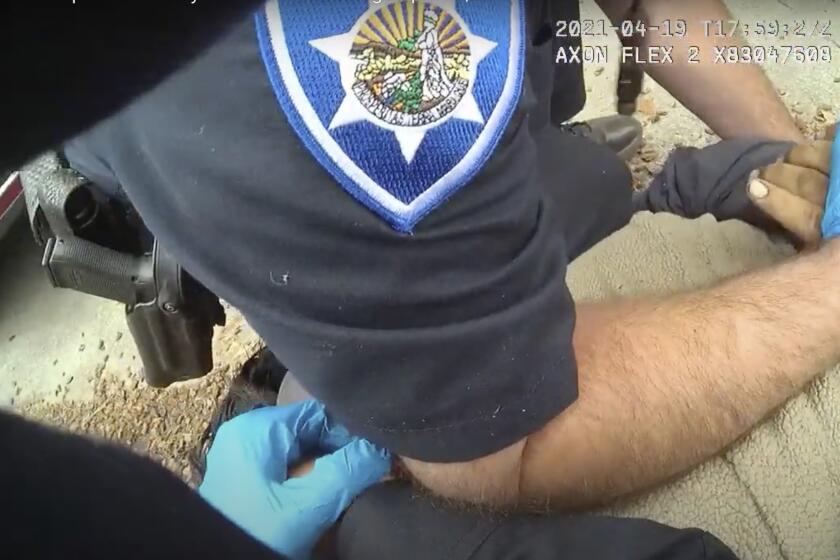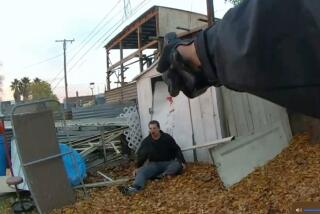Oakland man’s family sues over his death after police kneeled on his back

- Share via
OAKLAND — The family of an Oakland man who died after police held him down filed a wrongful-death lawsuit Friday, contending officers asphyxiated him during a confrontation that drew protests and comparisons to the killing of George Floyd.
The lawsuit cites a report released last week by the Alameda County coroner’s office that said the April 19 death of Mario Gonzalez was a homicide. The report said Gonzalez died from the “toxic effects of methamphetamine,” but the “physiologic stress” from his struggling and being restrained by police contributed to his death, along with alcoholism and obesity.
Officers had responded to a park to check reports that Gonzalez, 26, was acting strangely and appeared to be breaking security tags off alcohol bottles he had in two drugstore baskets.
His brother Jerry Gonzalez told the Associated Press in April that Gonzalez liked to get away from their neighborhood in east Oakland — where gang shootings, robberies and murders are relatively common — and go to nearby Alameda, a city on an island with beautiful homes, tree-lined streets and parks.
Attorneys for the family of a Latino man who died after an Alameda officer put a knee on his back and neck for more than four minutes, are asking the U.S. attorney general to conduct a federal civil rights investigation of the Bay Area police department.
Gonzalez died after three officers and a civilian parking enforcement employee pinned him face-down on the ground for more than five minutes, according to body-camera video released by police that showed one officer with a knee on Gonzalez’s back. Gonzalez stopped breathing and later died.
His death came a day before a jury in Minneapolis found former Police Officer Derek Chauvin guilty of murdering Floyd.
In a statement released after the coroner’s report was issued, Alameda Police Chief Nishant Joshi said the officers involved remain on administrative leave, and their peace officer powers have been suspended.
Joshi said he was committed to “full transparency and accountability into the tragic death of Mr. Gonzalez.”
The lawsuit was filed in federal court on behalf of Gonzalez’s 5-year-old son, Mario Jr., and names the city of Alameda, the former interim police chief and the three officers. It alleges wrongful use of deadly force, negligence and civil rights violations.
The suit alleges police improperly escalated the confrontation with Gonzalez, who appeared “disoriented and confused” but not threatening; ignored signs that he was dying; and used improper restraints that asphyxiated him.
Gonzalez “squirmed around in a desperate attempt to breathe, but never attacked, threatened, or violently resisted any officer,” the suit says.
“Mario was a peaceful, calm person,” Mario Jr.’s mother, Andrea Cortez, said in a statement released by the attorneys who filed the suit. “He adored our son and was a good father,” she said, adding that officers should have known to use better tactics.
“He wasn’t hurting anyone, and he was clearly confused,” Cortez said. “If they had rolled him on his side when the first officer said to, my son’s father might still be here.”
The Alameda County district attorney’s office, which is investigating Gonzalez’s death, didn’t immediately return an email seeking comment.
Alison Berry Wilkinson, the attorney for the officers, said they “look forward to the opportunity to prove in federal court that their actions during this encounter were reasonable, necessary, and lawful.”
“This was an unintended, unexpected and tragic death,” and the officers used “only trained and accepted law enforcement techniques,” she said in an email. “As the coroner noted, the cause of death was drug toxicity, and many of the injuries listed in the complaint were the result of the officers’ aggressive efforts to save Mr. Gonzalez’s life rather than their efforts to handcuff him.”
More to Read
Sign up for Essential California
The most important California stories and recommendations in your inbox every morning.
You may occasionally receive promotional content from the Los Angeles Times.














